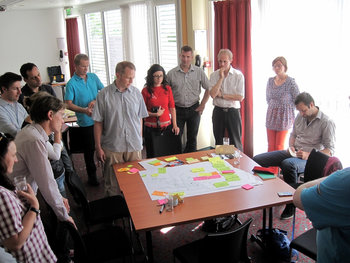
Build a productive and creative team culture. | Build partnerships and cross-discipline collaborations. |
Communicate to increase awareness of programs. | Comply with regulations, standards and policies. |
Continually improve project management practices. | Contribute to strategic planning at the organizational or department level e.g. IT strategy. |
Control change to programs and adapt to change. | Create program transparency with communication and reporting. |
Deliver interrelated projects of high complexity. | Deliver program and project objectives to budget and schedule commitments. |
Delivery of a portfolio of projects. | Enforce organizational policies and controls such as budget approvals. |
Engage stakeholders to clear issues. | Engage subject matter experts to develop plans and solutions. |
Establish program goals and objectives and map these to team and individual performance objectives. | Establish project management best practices. |
Evaluate and regularly reassess program costs, risks and benefits. | Identify and manage program risks. |
Manage business analysis processes such as requirements gathering. | Manage procurement processes such as RFPs. |
Manage program managers and project managers. | Manage stakeholder relationships. |
Manage systems analysis processes such as system architecture and design. | Matrix supervision of employees. |
Mentor and support program managers and project managers. | Organize and facilitate program and project meetings. |
Oversee performance management for program and project teams. | Own programs including communication with senior management. |
Perform data analysis and make recommendations and decisions to improve products, increase efficiency and reduce risk. | Perform financial analysis of programs such as return on investment. |
Plan and allocate resources to ensure that teams and vendors are consistently productive. | Plan and control budgets. |
Plan deployments and operations. | Prioritize between competing demands in an environment of constraint and risk. |
Provide direction and timely decisions to lead programs. | Recognize, manage and learn from failure with processes such lessons learned. |
Recruit and onboard program and project teams. | Report project status and key metrics. |
Represent program with governance bodies. | Resolve tradeoffs such as cost vs. functionality. |
Select and manage contractors. |
| Overview: Program Management Examples | ||
Type | ||
Definition | The practice of leading multiple projects and initiatives that may be interrelated in complex ways. | |
Related Concepts | ||


































